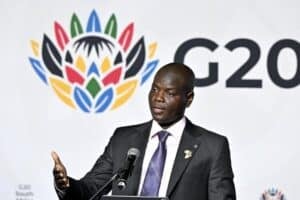António Guterres said there were signs throughout the world that 'people have had enough'.

UN secretary-general António Guterres emphasised a message demanding human rights and an end to inequality through a new social contract, especially during the Covid-19 pandemic.
Speaking at the 18th Nelson Mandela Annual Lecture on Saturday, Guterres said Nelson Mandela had dedicated his life to fighting inequality, “which has reached crisis proportions around the world in recent decades”.
He called on the global community to address the layers of inequality “before they destroy our economies and societies”.
These injustices have only become sharper amid Covid-19, Guterres added.
“The world is in turmoil, economies are in free fall and we have been brought to our knees by a microscopic virus.
“It has laid bare risks we have ignored for decades – inadequate health systems, gaps in social protection, structural inequalities, environmental degradation and the climate crisis.
“Entire regions that were making progress in eradicating poverty and narrowing inequality have been set back years in a matter of months,” he said.
“The virus has put those who were at a disadvantage in an even more vulnerable position, including the poor, the elderly and those with pre-existing conditions.”
Added to this, the economic impact had been devastating for informal workers as well as small- and medium-sized businesses and women the most, Guterres added.
Deepest recession
“We face the deepest global recession since World War II and the broadest collapse of incomes since 1870. 100 million more people could be pushed into extreme poverty and we could see famines of historic proportions.”
In this way, Covid-19 had revealed weaknesses in the foundations of many societies, he said.
“While we are all floating on the same sea, it is clear that some are in superyachts with others clinging to drifting debris.
“High levels of inequality are associated with economic instability, corruption, financial crises, increased crime and poor physical and mental health,” Guterres added.
He spoke about massive inequalities due to different forms of corruption as well as shortfalls in education and labour, calling for an end to tax havens and a stronger fight against tax evasion and money laundering.
However, Guterres said there were signs throughout the world that “people have had enough”.
He added this could be seen, for example, in global protests following the death of George Floyd in America: “We belong to each other, we stand together, or we fall apart. Today, in demonstrations for racial equality, campaigns against hate speech, in the struggle of people claiming their rights and standing up for future generations we see the beginnings of a new movement.”
“These movements point to two historical sources of inequality in our world – colonialism and patriarchy,” Guterres said, adding Africa had been a “double victim”.
“These can be seen in xenophobia, institutionalised racism, white supremacy, the global trade system and global power relations.
“To close these gaps and make the new social contract possible, we need a new global deal that creates equal opportunities for all and respects the rights and freedoms of all.”
This contract would need buy-in from individuals, government, civil society and private business to change the status quo, he added, saying to ensure this, investment into education and digital technology should be made.
“Now is the time for global leaders to decide will we succumb to division and inequality or will we right the wrongs of the past and move forward together for the good of all?
“We are at the breaking point, but we know which side of history we are on,” Guterres said.
For more news your way, download The Citizen’s app for iOS and Android.






